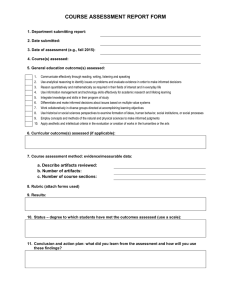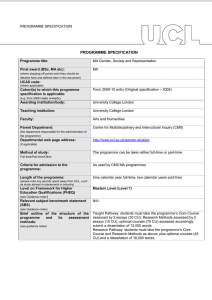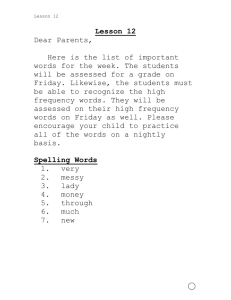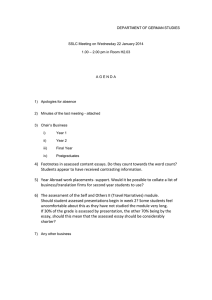PROGRAMME SPECIFICATION Programme title: Final award (BSc, MA etc):
advertisement
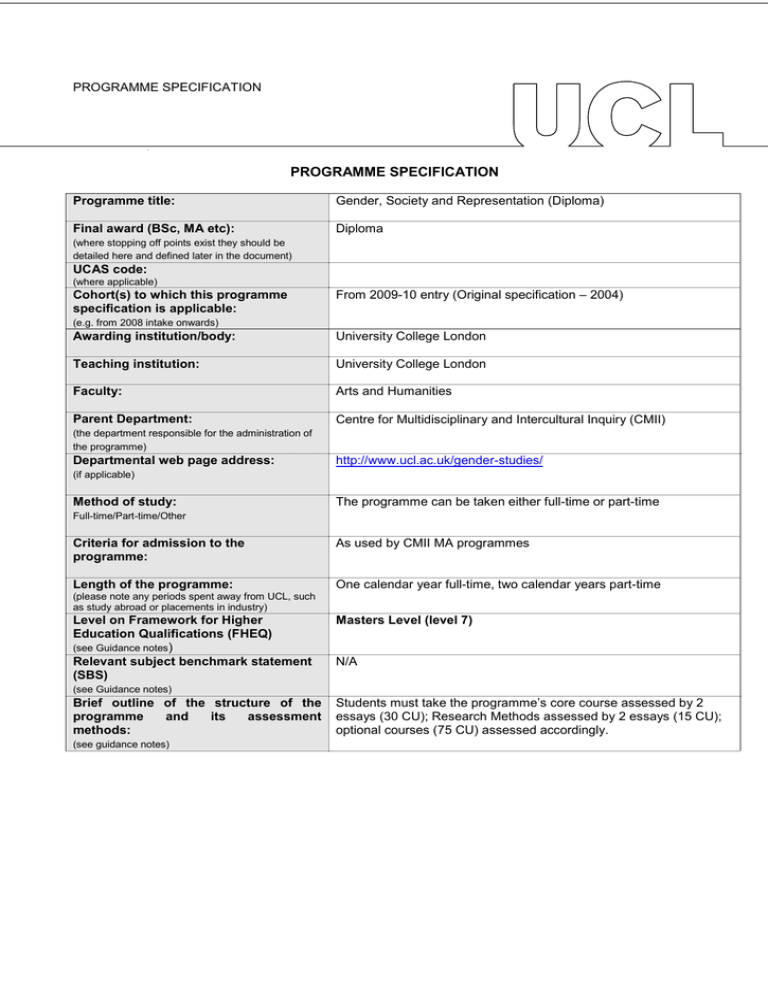
PROGRAMME SPECIFICATION PROGRAMME SPECIFICATION Programme title: Gender, Society and Representation (Diploma) Final award (BSc, MA etc): Diploma (where stopping off points exist they should be detailed here and defined later in the document) UCAS code: (where applicable) Cohort(s) to which this programme specification is applicable: From 2009-10 entry (Original specification – 2004) (e.g. from 2008 intake onwards) Awarding institution/body: University College London Teaching institution: University College London Faculty: Arts and Humanities Parent Department: Centre for Multidisciplinary and Intercultural Inquiry (CMII) (the department responsible for the administration of the programme) Departmental web page address: http://www.ucl.ac.uk/gender-studies/ (if applicable) Method of study: The programme can be taken either full-time or part-time Full-time/Part-time/Other Criteria for admission to the programme: As used by CMII MA programmes Length of the programme: One calendar year full-time, two calendar years part-time (please note any periods spent away from UCL, such as study abroad or placements in industry) Level on Framework for Higher Education Qualifications (FHEQ) (see Guidance notes) Relevant subject benchmark statement (SBS) Masters Level (level 7) N/A (see Guidance notes) Brief outline of the structure of the programme and its assessment methods: (see guidance notes) Students must take the programme’s core course assessed by 2 essays (30 CU); Research Methods assessed by 2 essays (15 CU); optional courses (75 CU) assessed accordingly. Board of Examiners: Name of Board of Examiners: MA Gender, Society and Representation Professional body accreditation (if applicable): N/A Date of next scheduled accreditation visit: EDUCATIONAL AIMS OF THE PROGRAMME: The programme aims (a) to equip suitably qualified students with the advanced skills, methods, concepts and theories essential for the study of aspects of gender in an interdisciplinary context at postgraduate level; (b) to give students the opportunity to apply these advanced methods, concepts and theories in both general and more specialised contexts; (c) to introduce students to new and intellectually demanding areas of Gender Studies; (d) to foster and develop students’ ability to think critically; (e) to foster students’ ability to carry out independent research. PROGRAMME OUTCOMES: The programme provides opportunities for students to develop and demonstrate knowledge and understanding, qualities, skills and other attributes in the following areas: A: Knowledge and understanding Knowledge and understanding of: 1. selected aspects of interdisciplinary gender studies at an advanced level 2. two or more specialised areas within gender studies at an advanced level 3. key methods and concepts relevant to the arts and humanities. 4. key methods and concepts relevant to the social and historical sciences 5. generic and subject-specific research skills and methods relevant to both the arts and humanities and the social and historical sciences Teaching/learning methods and strategies: 1-2 are acquired through participation in lectures and seminars (Core course, Research Methods and Options), where students learn how to present advanced material effectively, analyse demanding texts critically, and construct coherent arguments. Methods and concepts (3-5) are acquired in the Core course, including (a) Research Methods seminars, (b) Presentation and Research skills. Research skills and methods are developed in part (a+b) of the Core course. Methods, concepts and research skills are applied in the optional courses. Assessment: Assessed coursework in the form of assessed essays (1-5) and exams (in optional courses when required). B: Skills and other attributes Intellectual (thinking) skills: Students should be able to: 1. reason critically at an advanced level 2. apply concepts relevant to the arts and humanities and the social and historical sciences at an advanced level 3. identify and solve problems at an advanced level 4. analyse and interpret at an advanced level 5. demonstrate and exercise independent thought at an advanced level Teaching/learning methods and strategies: Intellectual skills are developed through the programme outlines above. All courses involve a combination of the most important concepts, practice in the application of concepts in oral and written form, and the analysis and interpretation of texts and evidence. Students are encouraged to reflect on and improve their work by means of feedback sessions on both presentations and essays. Assessment: The forms of assessment listed above all place emphasis on the student’s ability to demonstrate skills 15 by answering different types of questions (both orally and in writing), by finding solutions to problems set, and by producing coherent written arguments and oral presentations. Essays allow students to develop increasingly advanced research skills as well as greater intellectual independence. C: Skills and other attributes Practical skills (able to): Students learn to draw on a range of skills required to produce a piece of research at postgraduate level, including the following: 1. find, assess, evaluate and select information from a variety of sources 2. plan and produce a piece of research, based on a relevant and adequate bibliography 3. apply key methods and concepts relevant to both the arts and humanities and the social and historical sciences Teaching/learning methods and strategies: Over the entire programme, all students receive guidance on how to identify, locate and use material available in libraries and elsewhere. Students are provided with comprehensive bibliographies for each course, and they are also given help to produce coursework essays. Throughout the programme, students take part in classes on concepts relevant to the arts and humanities and the social and historical sciences. Assessment: Skills 1-3 are primarily assessed through assessed coursework (essays). D: Skills and other attributes Transferable skills (able to): 1. structure and communicate complex ideas effectively, both orally and in writing 2. manage time and work to deadlines 3. participate constructively and critically in groups 4. work independently and innovatively, and be self-reliant 5. find information and use IT 6. assess the relevance and importance of the ideas of others Teaching/learning methods and strategies: Skill 1 is developed by essay writing and presentations, both with feedback from the teacher and constructive criticism by peers, and also by the oral examination (discretionary). Skill 2 is developed through the need to meet deadlines for assessed essays while continuing weekly preparation for classes, giving presentations and participating in discussion groups. Skill 3 is developed through discussion, presentations and group work in lectures, seminars and tutorials. Skills 4 and 6 are developed during the planning, structuring and writing of the dissertation in particular. IT skills (5) are encouraged through essay writing, where word-processing is expected, and research, e.g. use of library catalogues on the internet. Assessment: The effective communication of ideas (skill 1) is an important criterion in assessing all areas of a student’s work, and regular feedback as well as the final mark reflect this. Skills 4 and 6 are assessed by both the coursework and the dissertation which, although supervised, are nevertheless the result of independent thought and research by the student. Skill 5 is assessed both indirectly, as students are expected to use library catalogues and other material on line, and directly as students are expected to rely on word-processing for their essays and are assessed for the presentation of their work as part of the overall assessment. Skill 2 is assessed by default, with penalties for the late submission of assessed work. Skill 3 is not formally assessed. the Framework for Higher Education Qualifications: (http://www.qaa.ac.uk/en/Publications/Documents/Framework-Higher-Education-Qualifications-08.pdf); the relevant Subject Benchmark Statements: (http://www.qaa.ac.uk/assuring-standards-and-quality/the-quality-code/subject-benchmark-statements); the programme specifications for UCL degree programmes in relevant subjects (where applicable); UCL teaching and learning policies; staff research. Please note: This specification provides a concise summary of the main features of the programme and the learning outcomes that a typical student might reasonably be expected to achieve and demonstrate if he/she takes full advantage of the learning opportunities that are provided. More detailed information on the learning outcomes, content and teaching, learning and assessment methods of each course unit/module can be found in the departmental course handbook. The accuracy of the information contained in this document is reviewed annually by UCL and may be checked by the Quality Assurance Agency. Programme Organiser(s) Dr Federica Mazzara / Dr Ann Varley (from 1 September 2014) Name(s): Date of Production: 22 October 2003 Date of Review: June 2014 Date approved by Head of Department: Date approved by Chair of Departmental Teaching Committee: Date approved by Faculty Teaching Committee
